I often see a lot of questions about rental property tax savings. Specifically, what are some rental property tax deductions people often overlook? As a former accountant myself, I know the tax rules are always evolving and full of exceptions. So I interviewed a veteran tax professional that specializes in rental properties to see which rental property tax deductions landlords often miss.
David Steiner from Zebulon Tax Advisory LLC was kind enough to offer his insights into some of the biggest rental property tax deduction mistakes he has seen over his 20+ years in the business. The following is a list of his 5 most often overlooked rental property tax deductions.
Keep reading to see if you are taking advantage of all 5 deductions.
EDIT January 2018: The TCJA passed in 2017 significantly changed the tax game for landlords. I’ve updated the Meals & Entertainment section below. Read more about how the TCJA impacts real estate businesses for more more information.
Top 5 Overlooked Rental Property Tax Deductions
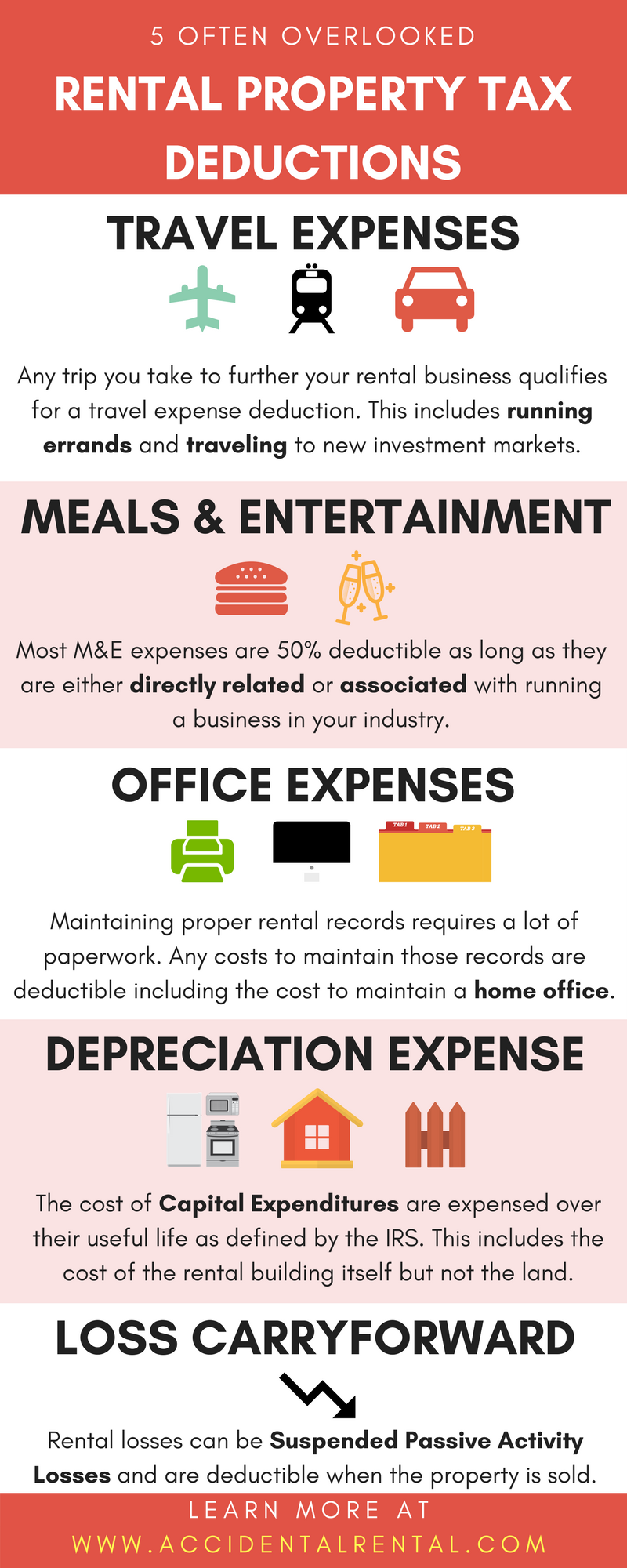
Share this Image On Your Site
#1 Overlooked Rental Property Tax Deduction – Travel

This is the biggest rental property tax deduction most landlords miss. According to David, “many landlords don’t realize they can deduct travel expenses related to the pursuit of their rental business. This includes mileage. If you drive to collect the rent or to pick up replacement toilet parts that counts.”
Qualifying Travel Expenses
Any trip or errand you run that is related to your rental property counts as an expense for the business. This includes trips to the bank, hardware store, lawyer, CPA, etc. As long as the trip is an “Ordinary and Necessary” part of managing a rental property, then the expense is deductible. More on “Ordinary and Necessary” expenses later.


For example, a trip to the dump to unload abandoned tenant furniture qualifies for the travel deduction. However, A trip to the gym so you can lift the furniture – probably doesn’t qualify.
Figuring Your Mileage Deduction
 Calculating your travel expense for mileage is easy. You can use either the Standard Mileage deduction or the Actual Cost method. The current standard mileage rate as of 2017 is 53.5 cents per mile but check the IRS site for the latest.
Calculating your travel expense for mileage is easy. You can use either the Standard Mileage deduction or the Actual Cost method. The current standard mileage rate as of 2017 is 53.5 cents per mile but check the IRS site for the latest.
Either way, the key is to keep excellent records. Without good records, the IRS may disallow these expenses.
If you use the Standard Mileage method, you will need to keep a travel log. Always keep good mileage records for tax purposes. Your log must include the miles driven, the purpose of the trip and the date of travel.
If you use the Actual Cost method instead, the IRS recommends you record your odometer readings at the beginning and end of each year to know the percent used for business travel. You can then apply this percentage to all car expenses incurred for the year.
I use the Standard Mileage deduction. It’s easier to maintain good records and you still get to deduct business related tolls and parking fees.
To track miles, check out the Everlance App available for free at the itunes store. It will automatically track your mileage via GPS. It’s very intuitive and is simple to use. You just need to tell it which trips are for business at the end of the day.
Travel Away From Your (Tax) Home
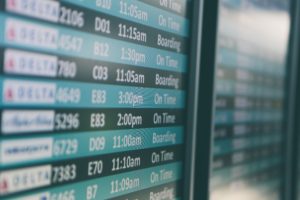
Travel doesn’t just mean trips to the local big box store. It can also mean business trips far away from home to attend a seminar or to investigate a new rental market for example.
These deductions are generally allowable as long as you are incurring expenses while traveling away from your tax home. Deductible expenses can include transportation, lodging, dry cleaning, meals, baggage fees, etc.
Note that to qualify for travel expenses, you must actually be away from your tax home. Your tax home is generally your place of business. Check out the IRS rules on tax home if you are not sure if you qualify.
#2 Overlooked Rental Property Tax Deduction – Meals & Entertainment

Meals and entertainment are often deductible as well but there are several hurdles you need to meet before they qualify for a rental property tax deduction.
EDIT January 2018: The TCJA passed in 2017 significantly changed what Meals & Entertainment expenses are deductible. The example table below has been updated but read more about how the TCJA impacts real estate businesses for more more information.
Ordinary and Necessary Hurdle
In order to qualify for a deduction these expenses must be “Ordinary and Necessary.” Ordinary means it is a common practice in your industry. Necessary is defined by the IRS as “helpful and appropriate for your trade or business.”
As a landlord, it is both common and helpful to buy lunch for professionals while working on your property all day. This would be allowed under the IRS rules.
Lavish and Extravagant Exception

Does that mean anything goes? No. Buying a lunch for workers is probably Ordinary and Necessary. But what if you bought lobsters for lunch? This may not be considered Ordinary or Necessary. But, as a new landlord, I’m sure you are more reasonable than this.
Business Related Hurdle
In addition, these expenses must meet one of two IRS tests to determine if the expense is related to your business. Here is the excerpt from Publication 463:
The Directly-Related Test
To meet the directly-related test for entertainment expenses (including entertainment-related meals), you must show that:
- The main purpose of the combined business and entertainment was the active conduct of business,
- You did engage in business with the person during the entertainment period, and
- You had more than a general expectation of getting income or some other specific business benefit at some future time.
The Associated Test
Even if your expenses don’t meet the directly-related test, they may meet the associated test. To meet the associated test for entertainment expenses (including entertainment-related meals), you must show that the entertainment is:
- Associated with the active conduct of your trade or business, and
- Directly before or after a substantial business discussion took place
How Much Can you Deduct?
Now that you’ve cleared the two IRS hurdles, how much can you deduct?
There are two types of meals and entertainment expenses. There are those that are only 50% deductible and those that are 100% deductible.
50% Deductible
Most of your expenses will fall into this category. These include:
- Meals and entertainment while traveling away from home
- Meals and entertainment while conducting business
During Travel
Meals and entertainment expenses incurred while on the road for business are 50% deductible. You can use either the actual cost method or apply a standard Meals & Incidental Expense allowance provided by the IRS which is currently $63 per day.
Entertaining Others
Generally you can also deduct 50% of the cost of business related meals and entertainment expenses incurred with business partners and prospects. But of course there are nuances and rules that apply to this category of expenses. See IRS Publication 463 for more details.
EDIT January 2018: The TCJA passed in 2017 disallows any entertainment expenses after 2017. Learn more here.
100% Deductible
Some expenses qualify for a full deduction. These generally don’t apply to most Accidental Landlords but here are some common types of meal and entertainment expenses that are 100% deductible:
- Meals at a company party
- Food and drinks offered to employees at work
- Food and drinks offered at a promotional event (e.g., trade booth at a real estate convention)
EDIT January 2018: The TCJA passed in 2017 disallows any entertainment expenses after 2017. Learn more here.
Here are some meal and entertainment expenses you might incur as a landlord and how you should treat them for tax purposes:
| EXPENSE | TREATMENT |
|---|---|
| Meals while attending a Real Estate seminar out of town. | 50% Deductible |
| Meals purchased for employees during a late night renovation. | 100% Deductible TCJA Update: 50% Deductible until 2025, not deductible after 2025. |
| Entertaining a local politician to persuade a vote in your favor on a zoning issue. | Not Deductible |
| Tickets to a sports game you give to your favorite tenants but you do not attend. | Deductible as a gift (up to $25 each) TCJA Update: Not deductible after 2017. |
| Tickets to a sports game for you and your favorite tenants. You discuss the property and other landlord issues. | 50% Deductible (only applies to the face value of the tickets – no service fees) TCJA Update: Not deductible after 2017. |
| You allow your rental property to be used for a charity entertainment event for free. | Deductible as a charitable contribution |
| You hold an offsite meeting with your property management team and immediately afterwards take them to a nightclub. | The offsite meeting is 100% deductible. The nightclub is 50% Deductible. TCJA Update: The Nightclub is not deductible after 2017. |
| You travel to a new market to see if it is a potential fit for your rental expansion plans. You decide to stay an extra night to check out the attractions. | The travel expenses are deductible. The meals are 50% deductible but not for the extra night. |
| You pay club dues to a golf resort. You occasionally invite prospective investors to join you for golf. | The club dues are not deductible. |
| You throw a party at your personal residence for potential clients. | 50% deductible. TCJA Update: Not deductible after 2017. |
Tips For Proper Meal and Entertainment Record Keeping
The IRS requires you to keep track of the following:
- The business purpose
- The amount of each expense
- The date and place of the entertainment
- The business relationship of the persons entertained
See David’s excellent article for more ways to save money by deducting meals and entertainment expenses.
#3 Overlooked Rental Property Tax Deduction – General Office Expenses

General office expenses
As an accidental landlord you are probably conducting much of your business out of your home. You know that there is a lot of paperwork involved in managing a rental property. Maintaining tenant leases, contact information, insurance records, property records, maintenance records, etc. Maintaining these records requires some general office expenses.
These expenses can quickly add up over the year. Rookie landlords often overlook them. You do not need to have a physical office to be able to take advantage of these deductions as long as they are ordinary and necessary. Here are some common examples:
- Computer & Printer (Capital Expenses)
- Cloud storage costs
- Business software
- Paper & Printer Ink
- Printer costs
- Filing cabinet (Capital Expense) and filing materials
- Dues and subscriptions
- Dedicated mobile phones
- Office Furniture (Capital Expense)
- Postage Expenses
Special rules for home office deduction

For many of us landlords our home is also where we conduct most of our business, so it’s easy to forget that a portion of our home office expenses could be deductible.
This used to be a cumbersome record-keeping burden. However, recent changes have made it much easier to take advantage of this deduction. In order to qualify for a home office expense deduction, you must meet the following two tests:
Regular & Exclusive Use – This means you must section off some portion of your home that is used exclusively and regularly for your business. A small bedroom converted to a home office qualifies as long as it is used exclusively and regularly. A dining room where you keep all of your records but also occasionally use for dining probably won’t qualify.
Principal Place of Business – This means you use your home office substantially and regularly for your business. It doesn’t mean it is the only place you conduct your business.
Figuring the Deduction
Calculating the deduction used be a pain but in 2013 the IRS introduced the Simplified Method. Essentially they will allow you to deduct $5 per Square Foot of home office space up to 300 square feet.
See IRS Publication 587 for more on the business use of home deduction rules.
Is the Home Office Deduction a Red Flag?
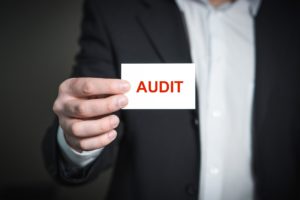
I have often heard that Home Office deductions are a big red flag for the IRS. However, David feels like this is no longer the case. As long as you use the Simplified Method for calculating home office expense deductions, you should be safe.
For more Home Office Deduction tips read David’s full article.
#4 Overlooked Rental Property Tax Deduction – Depreciation
Depreciation expense is one of the biggest tax benefits for landlords. This is how your property can provide monthly cash flow but often no taxable income. As a landlord, you are allowed to expense the cost of major assets over their useful life. This includes the cost of the building! Some accidental landlords fail to take advantage of this.
David says “You would be surprised how many returns I have seen where the landlord or the previous CPA failed to claim the proper depreciation expense.”
Capital Expense vs. Operating Expense

There are two types of expenses: Operating Expenses, which are expensed in the year incurred, and Capital Expenses, which are depreciated over their useful life. Determining which type of expense you are dealing with can be tricky.
Capital expenses fall into one of two categories. They are either business assets or improvements. Business assets are fairly easy to identify. If you purchase a new computer to track your property expenses, that is an asset with an extended useful life and should be depreciated.
Improvements are more confusing because the same type of expense can be treated as both an operating and a capital expense depending on the circumstances.
David clarifies this by stating “It depends on the intent of the improvement. If you are replacing a roof because a storm just blew it off, then you are bringing the asset back to its normal state. That’s an operating expense. If instead, you want to replace your old roof with a new, upgraded roof with solar panels and metal shingles, then you are making a capital improvement. That needs to be depreciated.”
How Depreciation Works
Depreciation is the process of recovering a capital expense over a longer time period. For example, instead of expensing a new dishwasher in the year it was purchased, landlords must expense a portion of the total expense each year for 5 years.
The IRS has determined how long an asset should be depreciated depending on its asset class. Below is a table of some common rental assets and how long they should be depreciated according to the MACRS convention.
| ASSET TYPE | RECOVERY PERIOD |
|---|---|
| Computers, Printers, Hard Drives | 5 Years |
| Office Machines (Copier, Fax Machine) | 5 Years |
| Automobiles, Light Trucks | 5 Years |
| Appliances | 5 Years |
| Carpets | 5 Years |
| Rental Property Furniture | 5 Years |
| Office Furniture | 7 Years |
| Other Property Not Classified | 7 Years |
| Fences | 15 Years |
| Residential Rental Property | 27.5 Years |
| Structural Components (Furnace, Plumbing) | 27.5 Years |
| Land | Never Depreciated |
Depreciation Recapture
Depreciation is an awesome tax benefit while you own your rental property. What happens when you go to sell your rental? Unfortunately, it’s time to pay up.
When you finally decide to sell your property you need to pay 25% tax on the gain represented by the depreciation you’ve taken over the years.
Let’s use an example to illustrate:
- Depreciable Cost Basis for building is $100,000
- Years of service as rental 5
- Gain on sale of property $25,000
Over the five years you owned this rental property, you were able to take a depreciation charge of $18,182 ($100,000/27.5 x 5 years). This portion of the gain will be taxed at 25% while the balance of the gain ($6,818) will be taxed at the capital gains tax rate of 20%. The reason is that the depreciation you realized over the five years was offsetting your ordinary income taxes, a higher tax rate.
Depreciation Quirk
There is one special quirk about depreciation that is important enough to know as a landlord. Whether you take the depreciation deduction or not, the IRS treats you as if you did. That means even if you never got the benefit of the depreciation deduction because you neglected to take it, you still owe the tax on the depreciation recapture.
The good news is that you can go back and amend the prior three years of tax returns to claim this deduction. However, anything beyond that is generally lost.
Pro Tip. Be sure to interview your tax preparer. Ask what percentage of their returns are rental property tax returns. Ideally your tax preparer owns a rental property themselves so they are very familiar with rental property tax deductions and can help you save as much on taxes as possible.
#5 Overlooked Rental Property Tax Deduction – Accidental Landlord Loss Carryforward

This is my favorite forgotten landlord deduction, just for the name alone.
As an accidental landlord, you probably only have one or two properties. You also likely have a day job and don’t work full-time on your real estate business (yet). This generally means your rental property investment is passive and its losses can’t be deducted from your ordinary income.
Passive Activity Losses
If you’re smart, you have been taking advantage of depreciation deductions and probably racked up some tax losses. However, as a passive real estate investor you cannot take full advantage of these deductions until you sell your property. These losses are referred to as suspended passive losses.
Every year, you can only deduct passive losses to the extent you realized passive gains. The gain can be from any passive activity, not just real estate rentals. Any losses not taken become suspended losses. Those suspended losses are waiting for passive gains to be used or until you sell your rental.
When you sell your rental property, you can then use those remaining suspended losses to offset the gain on the sale.
Good Records Are Essential To Use Suspended Losses

You need to maintain good records to take full advantage of this tax benefit. Your rental property cost basis determines your taxable gain. This is impacted by how much you invested into it and by how much you depreciated it over the years.
Your tax preparer or accountant will usually calculate your cost basis but it’s up to you to maintain proper records.
However, if you have switched tax preparers, they may not have transitioned all of those files to your new tax preparer. If you have subsequently disposed of your rental property at a gain, then you may have missed out on this major deduction. The suspended losses would have offset that gain and reduced your tax liability significantly.
If you are interested in learning more on the subject of passive activity rules. Check out this YouTube video.
Useful Record-Keeping Resources

Throughout this article, you probably picked up on a common theme. The IRS requires good documentation to substantiate your rental property tax deductions. Good record-keeping and substantiation is crucial in case of an audit.
There are a number of software programs and ledger systems available. Here are a few resources David recommends for his clients to keep track of these overlooked rental property tax deductions.
Most landlords choose QuickBooks to manage their rental properties. And many tax preparers are familiar with the software so they prefer landlords to use it as well. Rentec Direct offers an excellent overview of QuickBooks
for landlords if you want to learn more.
If you still prefer to log your expenses manually, David recommends an Ideal Rental Property Record Book. It will help you keep track of your expenses so you don’t overlook a deduction come tax time.

Pro Tip. Staying organized will not only save you money by taking advantage of overlooked rental property tax deductions, but it will also save you tax preparation fees come tax time! Many tax preparers charge a premium if you hand them a box of receipts in April. Stay organized and save!
Conclusion
Owning a rental property can provide significant tax advantages but you need to know which deductions qualify and how to keep track of them. If you overlook these rental property tax deductions, you are losing thousands on overpaid taxes. Luckily, in many cases, you can go back to reclaim some of these lost deductions by filing an amended tax return.
Good record-keeping is crucial to successfully defend an IRS audit. Each type of expense has different guidelines for what needs to be recorded. Know the rules so you don’t lose out on significant tax savings.
Finally, hire an experienced tax professional that knows rental property taxes. Many CPAs and tax preparers can miss tax-saving deductions if they are not familiar with the IRS rules. Ideally, look for one who owns a rental property or two so they can highlight which deductions you might be missing.
About David and Zebulon Tax Advisory

A special thanks to David at Zebulon Tax LLC for his invaluable help in crafting this article for the Accidental Rental community.
David Steiner has over 20 years of experience as a tax and financial consultant. David has also held the position of adjunct professor of Finance, Tax, and Economics at Union County College for over a decade.
He specializes in providing tax reduction strategies, helping individuals plan for a secure financial future, and developing strategies that focus on the distribution phase of each consumer’s life – whether it be planning for retirement in the immediate future, or current distributions in retirement.
David holds an Honors M.B.A. from Fordham University, where he double majored in Tax Accounting and Finance. While working in Washington, D.C. at The White House, he earned an undergraduate degree from The George Washington University.
For more rental property tax deduction tips and tricks call or email David at Zebulon Tax Advisory LLC.
david@zebtax.com
Phone: (973) 346-4150
Want More Awesome Landlord Tips?
Sign up today for the monthly Accidental Rental newsletter for access to more money saving tips! When you sign up, you will automatically receive my latest free gift designed to help save you money and become an awesome landlord.

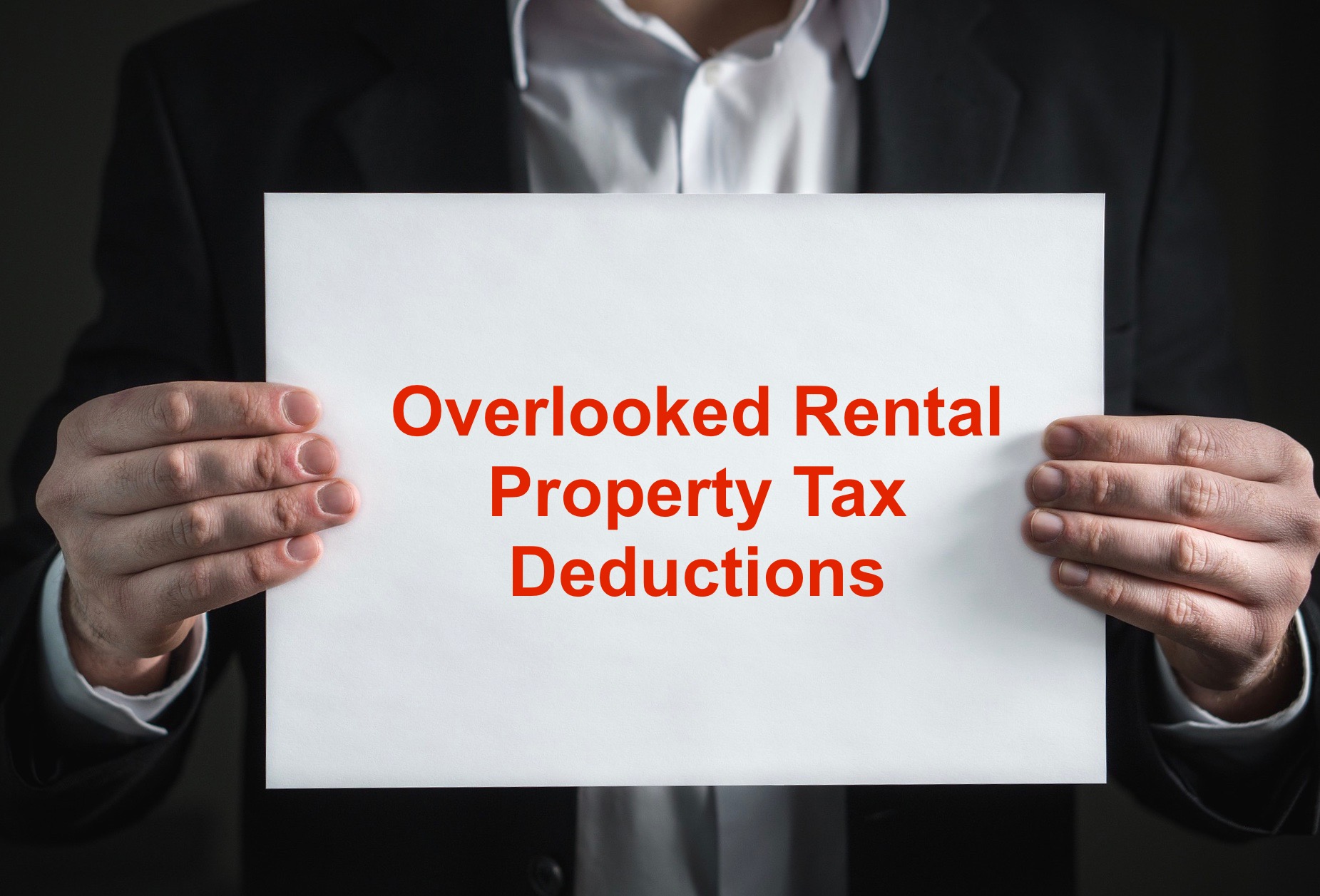


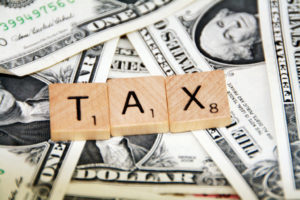
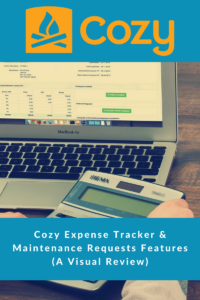
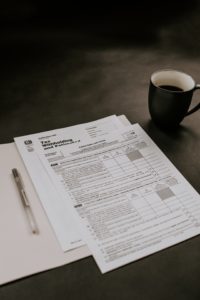
Thanks David awesome article
Thanks! Glad you liked it!
would love to see more tax deduction tips thanks